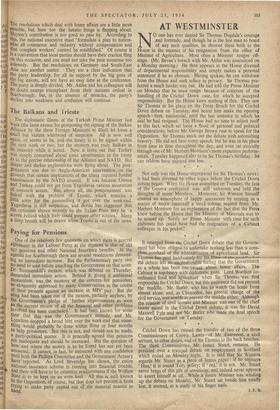AT WESTMINSTER N O one has ever denied Sir Thomas Dugdale's
courage and fortitude, and though he is the last man to boast Of any such qualities, he showed them both to the House in the manner of his resignation from the office of Minister of Agriculture. Most often a Minister resigns off- stage. (Mr. Bevan's breach with Mr. Attlee was announced on a Monday morning.) He then appears in the House divested of departmental responsibility and simply makes a personal statement if he so chooses. Having spoken, he can withdraw from the House and seek solace in privacy. Sir Thomas pre- ferred a much harder way out. He had told the Prime Minister on Monday that he must resign because of criticism of the handling of the Crichel Down case, for which he accepted responsibility. But the House knew nothing of this. They saw Sir Thomas in his 'place on the Front Bench for the Crichel Down debate on Tuesday, and heard him make the opening speech—firm, ministerial, until the last sentence in which ha said he had resigned. The House had no time to adjust itself to this fact, which set loose a flood of personal and political considerations, before Mr. George Brown rose to speak for the Opposition. Sir Thomas stuck out the debate with astonishing bravery. He did not hear every speech, but he was in his place from time to time throughout the day, and even sat stoically , through one of Mr. Herbert Morrison's more expansive perform- ances. Tuesday happened also to be Sir Thomas's birthday : ho can seldom have enjoyed one less.
Not only was the House unprepared for Sir Thomas's news : it had been diverted by other topics before the Crichel Down debate began. When the House assembled on Tuesday, the fate of the Geneva conference was still unknown and held the thoughts of many Members. Moreover, Sir Winston himself created an atmosphere of happy unconcern by treating as a matter of major statecraft a mock-solemn request from Mr. Herbert Morrison for an explanation of the fact that the Preis knew before the House that the Ministry of Materials was to be wound up. Surely no Prime Minister with time for such elaborate fun could have had the resignation of a Cabinet colleague in his pocket?
It emerged from the Crichel Down debate that the Govern- ment has been obliged to undertake nothing less than a com- plete overhaul of the administration of agricultural land. Sir Thomas has paid handsomely for his sha the debate left an uncomfortable feeling that the Government as a whole has been too casual about home affairs. The Cabinet is top-heavy with diplomatic guns. Lord Woolton co- ordinated food and agriculture when Sir Thomas was first responsible for Crichel Down, but this assistance did not prevent the muddle. Mr. Butler, who has to watch the home front almost alone, and, as Chancellor, has general charge of the civil service, was unable to prevent the muddle either. Although the relation of civil servant and Minister was one of the chief issues raised in the Crichel Down debate, it was Sir David Maxwell Fyfe and not Mr. Butler who made the final speech for the Government on Tuesday.
Crichel Down has caused the transfer of two of the three Commissioners of Crown Lands—of Mr. Eastwood, a civil servant, to other duties, and of Sir Thomas to the back benches. The third Commissioner, Mr. James Stuart, remains. He presided over a tranquil debate on employment in Scotland which ended on Monday night. It is said that Sir Winston regards Mr. Stuart as a piece of litmus paper: if he registers blue,' it is sound Tory policy; if red,' it is not. Mr. Stuart never brags of this gift of sensitivity, and indeed never appears to assert himself at all. While a junior Minister was winding up the debate on Monday, Mr. Stuart sat beside him totally lost, it seemed, in a study of his finger nails.
J. F. B.


































 Previous page
Previous page